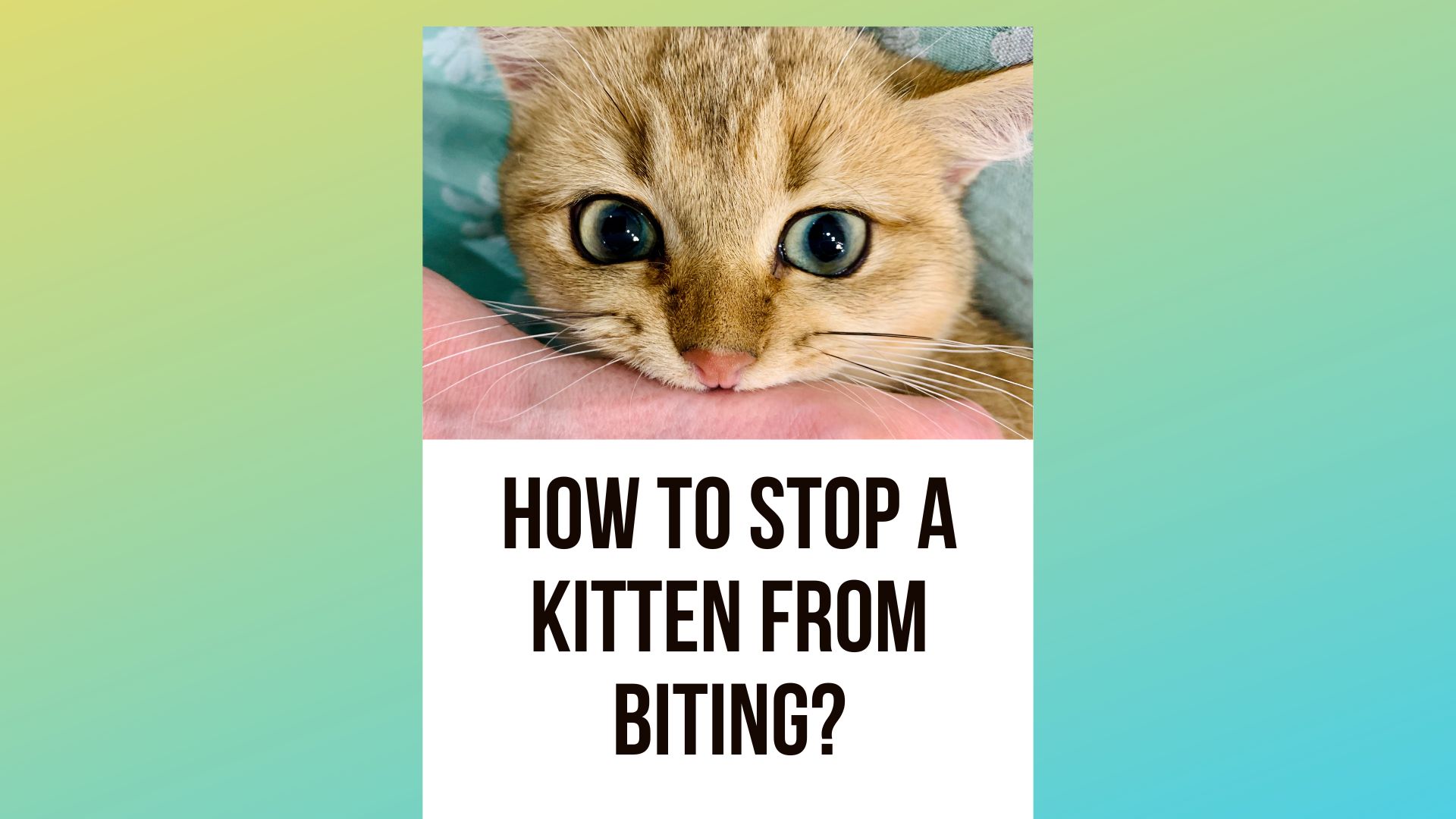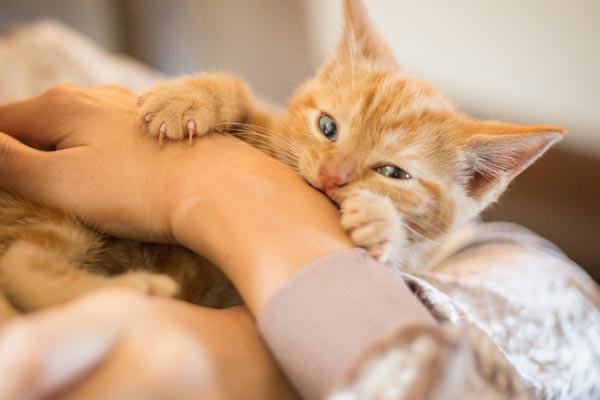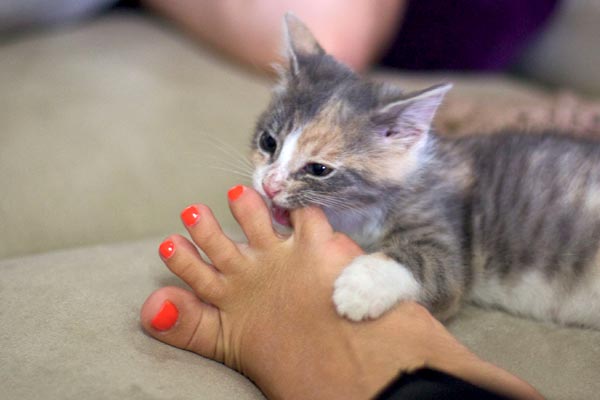
Why does my kitten keep biting me for no reason? What to do when your kitten won’t stop biting you?
“Ow!” That is a natural response to sharp little teeth piercing the tender skin of your finger, hand, or even your feet and toes. Take a deep breath, reign in the aggravation and knee-jerk reactions. Kittens bite, and it can be hard to distinguish if it’s playful, fearful, or just plain vengeful.
Should I tell my kitten off for biting? Do kittens grow out of biting?
How can something so adorably fluffy and comically dramatic find it in its tiny little heart to hurt you, and what can you do to stop it?! There are a few tips and tricks that can help you train your kitten to stop biting behavior.
Do You Really Want to Hurt Me?
Sure, it may seem like your kitten might be a tiny little ball of vengeance bent on destroying your property, your excellent skincare routine, or even your sanity. However, kittens bite for a variety of reasons. The first thing to remember is that a kitten is a baby, first and foremost.
According to Petfinder, kittens are much like puppies, they use their mouths to explore their environment. They learn by tasting, chewing, and sometimes biting the hand that feeds them. There’s also the possibility that your kitten might be teething.
Typically, biting behavior in kittens is not aggressive. Most of the time they become overstimulated in play, and biting is often curbed by their mother or littermates. That doesn’t necessarily mean that all kittens learn to inhibit this behavior.
How do I Know if My Kitten is Biting Out of Fear?
Kitten biting behavior is unwanted, but determining if your kitten is just being playful or if the biting is fear-driven is an important factor. When kittens are afraid, they exhibit body language to let you know. Instead of jumping to conclusions, take a moment to examine your kitten.
Were they running away from something? Hiding in a particular spot? Were they showing signs of aggression?
Back-arching, spitting or hissing, swishing their tail, or flattening their ears are just a few signs of fear-aggression that your kitten will show. If your kitten seems anxious and hiding, let them remain where they are. Make sure they have access to food, water, and their litter box.
If they lash out and bite, confine them to an area of the house where they can remain undisturbed, but keep a watchful eye on them. Gentle reassurances help calm your kitten.

How can I Determine if My Kitten is Teething?
Kittens, much like humans, have two sets of teeth. Baby teeth come in shortly after a kitten is born. Once a kitten reaches about four months of age, they enter the teething process.
Dr. Jan Bellows, a Doctor of Veterinary Medicine at Veterinary Centers of America, says that a kitten will display signs of teething. This is often drooling, chewing and biting, and irritability. They may also be reluctant to eat, due to sore gums.
If your kitten is displaying this behavior, it’s important to make sure they don’t chew on shoes, clothing, furniture, or hard objects. This could ruin your belongings or be painful to your teething kitten.
Make sure to provide soft, moist food for a teething kitten. Keep a few kitten teething toys on hand, and try to redirect their attention as often as possible from objects they shouldn’t be chewing on.
My Kitten isn’t Teething, What do I do Now?
If you’ve determined that your kitten isn’t teething, then it’s time to find out if they’re being overstimulated in play. Most of the time this comes from playing too hard with your kitten. Jackson Galaxy, cat therapist and host of My Cat From Hell, says that the fault of aggressive behavior typically lies with the human.
By playing with a kitten too roughly, we can encourage aggressive behaviors that become learned. This leads not only to biting but further aggression as the kitten becomes older. Kittens learn and are stimulated by their environment.
Make sure you aren’t playing too roughly with your kitten. Utilize toys, but allow cool-down periods in between play so that your kitten doesn’t become over stimulated. You can also redirect your kitten’s attention and focus on another object.
How do I Know if My Kitten is in “Play Mode”?
It’s important to understand kitten body language to determine if they’re in “play mode”. Your kitten will use its body language to let you know they’re ready for some human-kitten playtime. Playtime is bonding time with your kitten, and also a good way to train them.
Kittens exhibit signs of play. Sometimes they’ll be laid on their sides, claws unsheathed, but relaxed. Other times they’ll be crouched to pounce, with tail lashing and eyes wide open.
Keep an eye on your kitten’s body language. Your kitten will let you know when she’s ready to play. Then it’ll be time to utilize their toys.

How to Utilize Toys to Inhibit Biting
The idea is to keep your fingers and hands out of playtime with your kitten. They can’t bite you if you’re not in reach. The Humane Society suggests using a fishing pole toy.
Use the toy to keep your kitten entertained. Bounce the toy gently to attract your kitten’s attention, and let the predator instincts take over. Your kitten will enjoy the time with you and learn valuable life skills!
If your kitten insists on playing roughly, then a wrestling toy should work. You can take any small “prey animal” toy and rub it along your kitten’s belly. The kitten should latch on, just be sure to get your hands out of the way! This allows your kitten to take out some play aggression on an appropriate object instead of chewing on your hands and fingers.
How to Calm Down Your Hyper Kitten
Sometimes biting behavior can result from overstimulation, either by being petted or in play. Some signs that point to overstimulation is fur rippling on the back and sides, tensing of the body, swishing the tail, or staring.
Less is more when it comes to petting. To manage overstimulation, stop petting your kitten when it shows subtle signs. If it seems like your kitten is unpredictable, try using a wooden back scratcher until you can learn the signs they might exhibit before overstimulation occurs.
If your kitten is becoming overstimulated in play, then it’s time to calm down before someone (namely you) get bitten or scratched. Slow the playdown, allow your kitten to relax, and go in search of food or water.
Kittens typically work on a schedule. Play, eat, groom, and then sleep. Slowing downplay lets your kitten ease into eating, then grooming, and then a quick cat-nap.
This schedule keeps your kitten happy and healthy and helps to calm them if they become hyper during play.
How can I Teach My Kitten Not to Bite?
If your kitten still doesn’t take well to redirection to stop biting, it’s time to take more the initiative. When a kitten bites a littermate too hard, they typically squeal in displeasure. That lets kittens learn that they’re being too aggressive.
When your kitten bites your fingers, be loud and yell out “Ouch”. Make sure it’s a high-pitched yelp, to get your kitten’s attention. This will indicate that the play was too hard.
Slowly remove your finger. Jerking too fast or too hard might hurt your kitten or make your finger an even more interesting target. Redirect your kitten’s attention to another object, like a wrestling toy.
Once your kitten doesn’t return to nip at you, then you can use the fishing pole toy as a play reward. This teaches your kitten that good behavior is rewarded. Don’t try to pet or cuddle at this point, play teaches your kitten to hunt, and anything is fair game.
What are Some Other Tips and Tricks to Keep a Kitten from Biting?
If using redirection with toys and play doesn’t seem to be helping your kitten, you may need to find other measures. You need to make sure that you are setting rules for your kitten. Discourage bad behaviors, and make sure everyone in your household is consistent.
You may need to use “Spray Bottle Training”, according to Registered Vet Tech Adrienne Kruzer, to help your kitten learn not to bite or chew. Fill a clean spray bottle with room temperature water. Keep it handy, because consistency and patience are key.
If you find your kitten in unwanted behaviors like chewing on cords or furniture or biting at toes and feet, spray them with the bottle. Keep in mind not to aim for the kitten’s face, keep the spraying to their back or belly. Only spray once, this should startle them enough to stop the behavior and be redirected in a positive way.
Don’t overuse a spray bottle, and stop immediately if your kitten becomes anxious or afraid. The point is to startle them out of a behavior, not scare or hurt them.
Another way to keep your kitten from biting your fingers and hands is to rub a little Bitter Apple or Lemon Juice on your skin. This makes your fingers and hands less appealing, and tastes appalling to your kitten.
Should I Punish My Kitten if Nothing Else Works?
Again, be patient and consistent in your training methods. Kittens don’t respond to punishment. It only serves to make them afraid or wary of you.
Being afraid will only reinforce their instinctive fear response, which includes biting and scratching. It’s better to react calmly to any bite behaviors. Don’t lose your temper!
Keep in mind that they are still babies, still learning. Hitting or swatting at your kitten makes them anxious, and you could accidentally hurt them. Instead of learning the behaviors you want, they may end up avoiding you altogether.
Instead, stick to your redirection methods. Through patience, your kitten will learn to stop their unwanted behaviors, like biting. They are intelligent animals, give them the space and time needed to understand what you want from them.
Are There Any Other Resources I can Use?
There are several training videos on platforms like Youtube and Vimeo. Cat behaviorists, Veterinarians, or just plain cat enthusiasts have created well-thought-out videos. These include step-by-step instructional videos on the care and training of your kitten.
How to Train Your Kitten To Play Gently is a video on the Youtube Platform by Howdini. It has some helpful tips on how to keep your kitten from biting and playing rough. It is a helpful resource to fall back on in the care and training of your kitten.
Make Sure to Treat Bite Wounds Accordingly
If your kitten does happen to bite you and break your skin, always keep in mind that a bite wound from a kitten will still need proper wound care. Many kitten bites can become infected if not cared for immediately.
Wash the bite wound with soap and water to clean the area. Press a cloth firmly to the bite to stop any bleeding. Keep a clean bandage on the wound, and keep the wound elevated to prevent swelling or infection.
Remember not to be angry or punish your kitten for breaking the skin with a bite. Their little teeth are sharp and in most instances, it’s not aggressive behavior behind a kitten bite.
Kittens bite for a variety of reasons. Determining the cause for the biting behavior helps to determine the course of action you need to take to resolve it. Being a good pet parent means you must have patience and understanding.
Your kitten doesn’t use human words to let you know what’s wrong. Be mindful of their actions, their body language, and their temperament. It’s important to communicate in an effective way with your kitten for them to understand the consequences of bite behavior.
Adding a kitten to your household will bring joy and comedy, but like any baby, they need boundaries. Don’t let biting behavior go unchecked. Without gentle redirection and training, biting in kittens can turn to actual aggression in adult cats.
Redirection and consistency in training your kitten will be the key to success.

Hi, This is Alexa, and I love cats. This Website is a Complete Journal about how to travel with a cat and other information about Cat Health, Cat Training, Cat Behavior, Cat Foods and more. I hope you find it useful.
